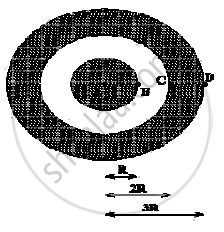Advertisements
Advertisements
प्रश्न
Fill in the blank.
A point charge is placed at the centre of a hollow conducting sphere of internal radius 'r' and outer radius '2r'. The ratio of the surface charge density of the inner surface to that of the outer surface will be_________.
उत्तर
Let the point charge be q.
by gauss's law, the charge on the inner surface will be - q
Surface charge density of the inner surface `sigma_i = - q/(4pir^2)`
by charge conservation, on the hollow sphere, the outer surface will have charge q
Surface charge density of the inner surface `sigma_o = q/(4pi(2r)^2) = q/(16pir^2)`
ratio = `sigma_i/sigma_o = (-q/(4pir^2))/(q/(16pir^2)) = -4/1`
APPEARS IN
संबंधित प्रश्न
A spherical conductor of radius 12 cm has a charge of 1.6 × 10−7 C distributed uniformly on its surface. What is the electric field
- inside the sphere
- just outside the sphere
- at a point 18 cm from the centre of the sphere?
(a) Show that the normal component of electrostatic field has a discontinuity from one side of a charged surface to another given by
`(vec"E"_2 - vec"E"_1).hat"n" = sigma/in_0`
Where `hat"n"` is a unit vector normal to the surface at a point and σ is the surface charge density at that point. (The direction of `hat"n"` is from side 1 to side 2.) Hence show that just outside a conductor, the electric field is σ `hat"n"/in_0`
(b) Show that the tangential component of electrostatic field is continuous from one side of a charged surface to another.
[Hint: For (a), use Gauss’s law. For, (b) use the fact that work done by electrostatic field on a closed loop is zero.]
If Coulomb’s law involved 1/r3 dependence (instead of 1/r2), would Gauss’s law be still true?
Define electrostatic potential at a point. Write its S.I. unit. Three-point charges q1, q2 and q3 are kept respectively at points A, B, and C as shown in the figure, Derive the expression for the electrostatic potential energy of the system.

Electric-field magnitude 'E' at points inside and outside a positively charged spherical conductor having charge Q and a radius R are ______.
If R is the radius of a spherical conductor, Vm the dielectric strength, then the maximum electric-field magnitude to which it can be raised is ______.
The electrostatic force between the metal plates of an isolated parallel plate capacitor C having a charge Q and area A, is ______.
Which of the following statement is true?
Which of the following statements is false for a perfect conductor?
A solid spherical conductor has charge +Q and radius R. It is surrounded by a solid spherical shell with charge -Q, inner radius 2R, and outer radius 3R. Which of the following statements is true?

